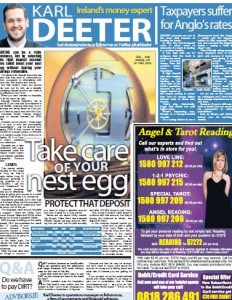 Deposit accounts are one of the safest places you can put your money, the issue with them traditionally has been that they tend to under-perform versus alternatives with some risk (like stocks and bonds).
Deposit accounts are one of the safest places you can put your money, the issue with them traditionally has been that they tend to under-perform versus alternatives with some risk (like stocks and bonds).
But that doesn’t mean you should only ever opt for risk, a steadily increasing plain vanilla deposit account can make a big difference over time, indeed, it lead Albert Einstein to once say that ‘the most powerful force in the universe is compound interest’.
When you earn interest on deposits you also make money at a far lower tax band, DIRT or (Deposit Interest Retention Tax) is 27% from the 1st of January 2011, and it is considered by Revenue to be a ‘final liability for income tax’ meaning that if you are generally being taxed at 41% that payment of DIRT satisfies your full obligation. Universal Social Charge (USC) does not apply to deposit interest but PRSI may apply.
For some people (aged 65 or over or permanently incapacitated) they may even have an exemption from paying this tax if your income is below €20,000 for a single person or €40,000 f0r a married couple. If you think this may apply to you then fill in a ‘Form 54 Claim’ from the Revenue website.
Deposits are a safe investment, many are guaranteed to any amount under the present ‘Credit Institutions Eligible Liabilities Guarantee Scheme 2009’; this covers certain deposits for 5 years once they are made prior to the 30th of June 2011 (although generally our deposit guarantee scheme only covers up to €100,000).
I use the word ‘investment’ for a deposit because what you are effectively doing is giving your money to a credit institution and they lend it out to borrowers, its called ‘intermediation’, and while depositors generally don’t ever lose out if a bank folds (a recent example in Denmark being an exception), it is important to know that banks don’t create your interest return out of thin air, and therefore a deposit is in part an investment in that institution – of the most secure and safe kind.
The language used around deposits is unusual you have CAR’s and AER’s which mean ‘Compound Annual Rate’ and ‘Annual Equivalent Rate’ respectively. AER is a way of telling you the ‘yearly’ interest which most people understand, and is often used when the term is below or above one year (for example a 3 month deposit), CAR on the other hand is generally used to demonstrate the result after 12 months of compounding.
The ‘term’ of an account is the language used when a deposit has a certain life length. Sometimes they will have a ‘notice’ period or they might just be ‘demand’ which means you can have all of your money when you want.
On this weeks tables we have the best of the best available at present listed for you along with any exclusions. Often the best rates have two things in common, firstly you have to lodge in a sizeable amount and secondly you have to lock it away for a period of time.
Banks are not above tricky marketing though, Ulsterbank have a ‘Special Interest’ regular savings account offering 4% but the interest is paid annually, and after €15,000 the rate drops by 63% to 1.5%! Meaning that after just over a year it doesn’t make sense to continue with this account, but they are hoping that the customer is ‘sticky’, or that they stay with them as a habit has been set, having said that, the rate is good and they are number 1 in the demand account regular saver area for this reason.
It pays to do your research, if you look at the 1yr deposit market you could end up with a paltry 1.7% from Rabo or as much as 3.6% from KBC! There are also players in the market who didn’t make our ‘best buy list’ such as Investec and NationWideUK (Ireland) who also have good deposit rates and who are non-Irish for those of you who may be (either rightly or wrongly) paranoid about keeping money in Irish banks.

Post a Comment